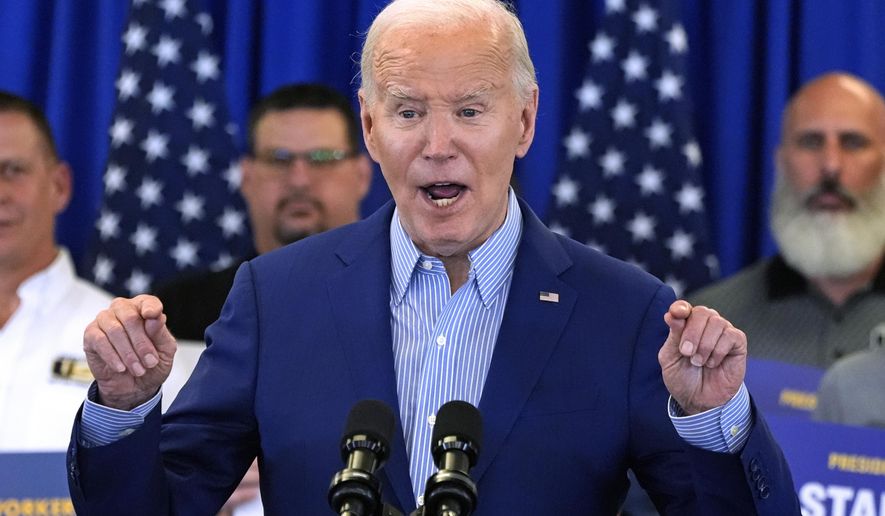For the second time in a matter of days, President Biden addressed one of the nation’s most important labor unions to boast that he’s fighting for them, but he’s also fighting to keep his grip on the once-reliable Democratic constituency.
Recent polls show Mr. Biden struggling to win support with union households for his reelection, with fewer union members backing him in battleground states than in 2020.
Labor unions also are losing political clout with only a small share of workers belonging to unions. And the unions gaining members are public sector unions, not the traditional unions Mr. Biden is courting.
Mr. Biden on Friday addressed the International Brotherhood of Electrical Workers Construction and Maintenance Conference in Washington. The electrical union, which represents about 775,000 members and retirees, has endorsed Mr. Biden over former President Donald Trump.
Just days earlier Mr. Biden addressed the United Steelworkers union at their headquarters in Pittsburgh, where he pledged to raise tariffs on Chinese steel and aluminum, one of the union’s top priorities.
Since taking office Mr. Biden has routinely boasted that he’s the “most pro-union” president in U.S. history and he’s been determined to prove it.
Nearly all of Mr. Biden’s most significant legislation, including the clean-energy bill and allocating money to build semiconductors, catered to labor union priorities.
He also has provided union workers with subsidies, tax credits, pension bailouts, funds for apprenticeships, and more. Mr. Biden even became the first president to join a picket line when he marched with striking United Auto Workers in September.
Even as Mr. Biden aggressively pursues their vote, labor unions simply don’t have the strength or the political weight they once did.
The percentage of American workers in unions has not increased over the past three years. Only 10% of all workers are unionized, according to data from the Bureau of Labor Statistics and in the private sector, that number falls below 7% as public sector unions have become more dominant.
On Friday, Mr. Biden told IBEW workers that he was union from “belt buckle to shoe sole.”
“Thanks to the bipartisan infrastructure law, 51,000 new infrastructure projects have been announced so far,” he said. “And we’re just beginning — roads, bridges, ports, airports, clean water system, affordable high-speed internet — all across America installed by IBEW workers,” he said.
Union leadership across the country has rewarded Mr. Biden with a slew of endorsements. He’s already won the backing of the United Auto Workers, the Service Employees International, AFSCME public employees’ union, the AFL-CIO, United Steelworkers and the Teamsters.
But polls show Mr. Biden’s support among rank-and-file union workers is much shakier. A New York Times/Siena College poll of six swing states revealed Mr. Biden and Mr. Trump are tied at 47% among union members when asked who they’d vote for in November.
In Michigan, union workers backed Mr. Biden by 25 points over Mr. Trump in 2020, according to the National Election Pool exit poll. A Fox News poll last month found Mr. Biden’s lead among union voters in the state to 12%.
Mr. Biden got 56% of the union household vote in 2020, according to AP VoteCast.
In 2016, Mr. Trump’s efforts to court blue-collar voters paid off allowing him to flip Michigan, Pennsylvania and Wisconsin, wiping out the Democrats’ blue wall.
Despite Mr. Biden’s hard work to win their votes, union households, Democratic can’t afford any slippage among union households.
Mr. Biden is already hemorrhaging support among young progressives, Black voters and Hispanic voters. If he is unable to retain his base, he may lose some critical battleground states.
Despite labor unions losing their resonance, public support for labor is at an all-time high. Today, nearly 75% of Americans say they support unions, according to a Gallup poll. That’s the highest mark since the 1960s. Just 15 years ago, the number had dipped below 50% for the first time since Gallup started the survey in the 1930s.
• Jeff Mordock can be reached at jmordock@washingtontimes.com.




Please read our comment policy before commenting.